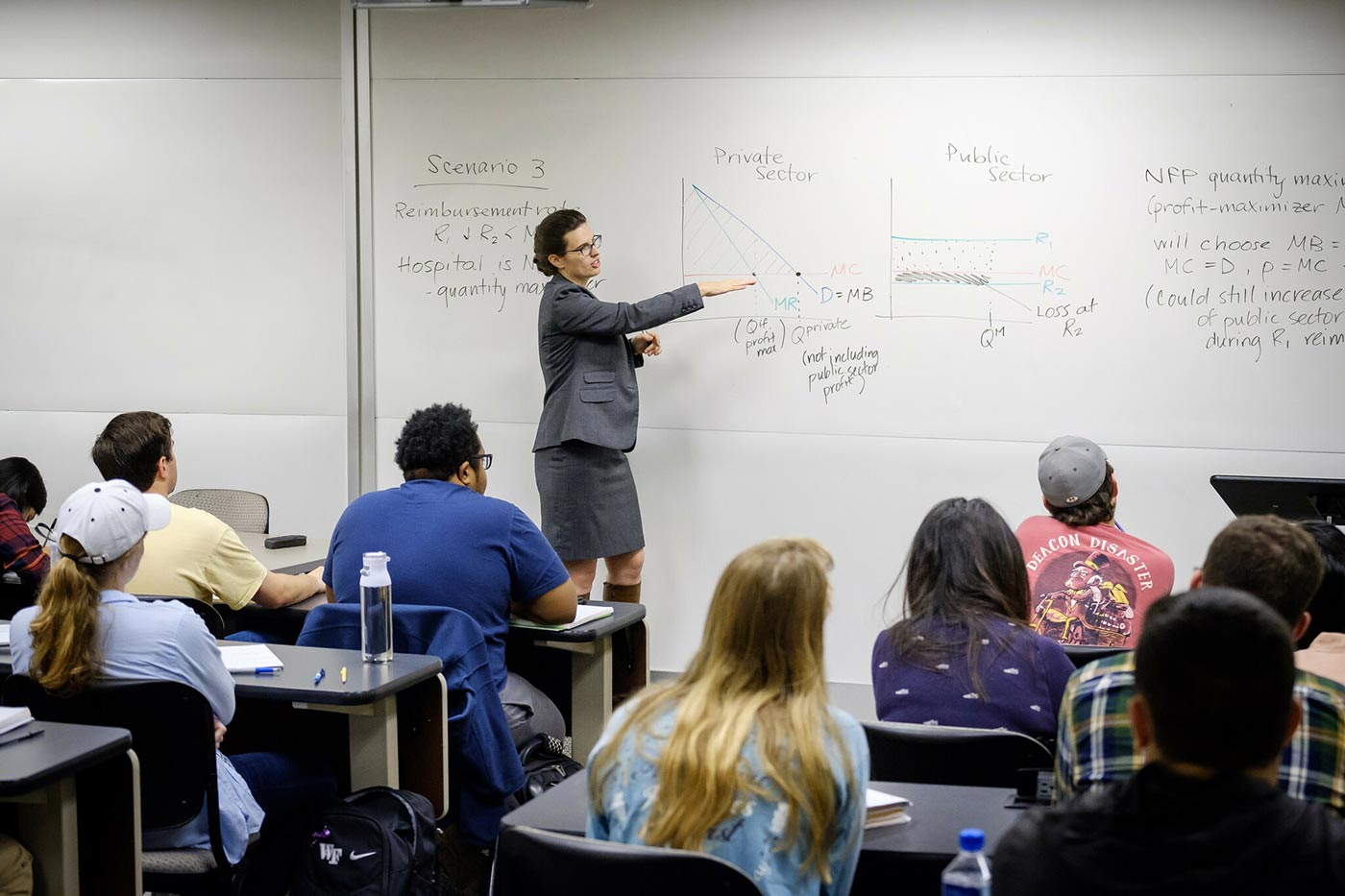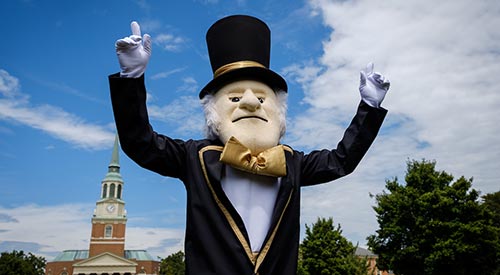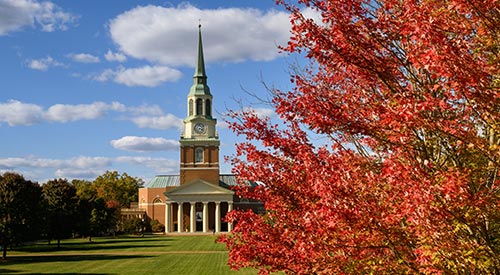Economics

Economics Degree
Bachelor of Science, Bachelor of Arts, Minor
Program Type:
Major, Minor
Career Path:
Business and Finance
Program Site:
College or School:
Why study Economics?
Wake Forest Economics students are inquisitive people of diverse interests who benefit from the University’s emphasis on interdisciplinary education. Not only do they learn about the nuts and bolts of economic theory, but more importantly the usefulness of economic theory in managing their personal affairs and dealing with social and political problems.
- Economics was the most popular major within Wake Forest College and second for all majors in the Class of 2025. Additionally, it has been the fourth most popular major overall and the third in Wake Forest College among graduates over the past 10 years (2016-25).
- Economics majors have the opportunity to compete in intercollegiate events such as the National College Fed Challenge, in which teams are given economic and financial conditions in a case-study format and make monetary policy recommendations.
- Economics majors have the opportunity to do current and relevant research with faculty as a Student Research Assistant and are presented with several opportunities to gain leadership skills as a Student Teaching Assistant.
- Dr. Robert Whaples is one of the nation’s leading advocates for the eradication of the penny from the U.S. currency system. (Each penny costs 3 cents to make.)
- Koleman Strumpf, Professor and Burchfield Presidential Chair of Political Economy, has been recognized for his work on political prediction markets and the large amount of media attention it received throughout the Fall 2024 election cycle. His publications have been mentioned in The Wall Street Journal, The Economist, CNBC, Bloomberg, Reuters, CNN, Fortune, New York Magazine, Business Insider, Marketwatch, Vox, and Morningstar.
The Economics degree is offered as a Bachelor of Science (B.S.), Bachelor of Arts (B.A.), and a minor.
What classes would I take?
Our model and curriculum educate the whole person and often help students discover interests they had never previously discovered. Students generally take 100-200 level courses during their first year of college, while registering for higher level courses as upperclassmen.
Sample courses* that you may take as an Economics student include:
100-200 level
- Intermediate Microeconomics
- Intermediate Macroeconomics
- Economics of Health and Medicine
- Environmental and Natural Resource Economics
- Current Economic Issues
300 level
- Law and Economics
- Behavioral Economics
- Prediction Markets
- Money, Banking, & Financial Markets
- Economics in Sports
* Course availability and offerings can change at any time. Refer to the Academic Bulletin to view all major requirements.
What kind of experience will I gain?
Former Wake Forest Economics majors have found their calling in a wide variety of professions and positions with companies across the globe. By developing analytical and quantitative skills, they’ve learned to understand the intricate
connections between economies, policies, and human behavior.
The rigorous coursework in Economics serves as a profound preparation for what lies ahead. It teaches students to hold complexity with character, making it an excellent foundation for graduate studies in economics and public policy.
For those who wish to continue their education and pursue an advanced degree, the critical thinking students cultivate at Wake Forest is also a powerful asset for further studies in law or business school.
Students in this program will develop the following skills:
- Critical thinking skills
- Analytical skills
- Data analysis and interpretation skills
- Written communication skills
- Problem-solving
- Program development
- Critiquing and diagnosing problems
- Decision-making
- Analyzing public policies
- Analyzing manpower requirements
- Systematizing/organizing material
- Team building
- Goal setting
- Trouble-shooting
Are there extracurricular activities?
Joining a club or organization is a great way to get involved and do more with your major. Our Economics students participate in the following programs:
- Everyday Econ Student Club
- Women in Economics
- Sports Analytics
What kind of job can I get?
Careers that often interest Economics majors, and fields our graduates work in, include:
- Transitions M&A Analyst
- Economic Research Analyst
- Program Associate for Mergers and Acquisitions
- Management Consulting Analyst
- FSI Compliance and Operational Risk Analyst
- Investment Banking Analyst
- Credit Resolution Analyst
Recent Wake Forest Economics graduates can be found working at:
- Levi’s
- Capco
- CGI
- Deloitte
- EY
- Morgan Stanley
- BRG
- United States Federal Reserve System
- United States Congress
- PGA Tour
- Detroit Lions (NFL)
- Truist
Generally speaking, a recent Wall Street Journal analysis concluded that Economics majors have the second-highest mid-career salaries of any discipline outside of Engineering.
Related Programs

Majors & Minors
Choose from more than 50 majors and over 60 minors to find your perfect fit.

Life at Wake
Take a moment to explore all the student experiences that make Wake Forest unique.

Virtual Tour
Can’t make it for a visit? No problem! Let us show you around campus virtually.

Keep in Touch
Let us know you’re interested in Wake Forest and we’ll do the rest.

Visit Campus
You truly can’t appreciate the beauty of our campus until you experience it for yourself.

Apply
Want to be considered for our next class of Demon Deacons? Here’s how to get started.
